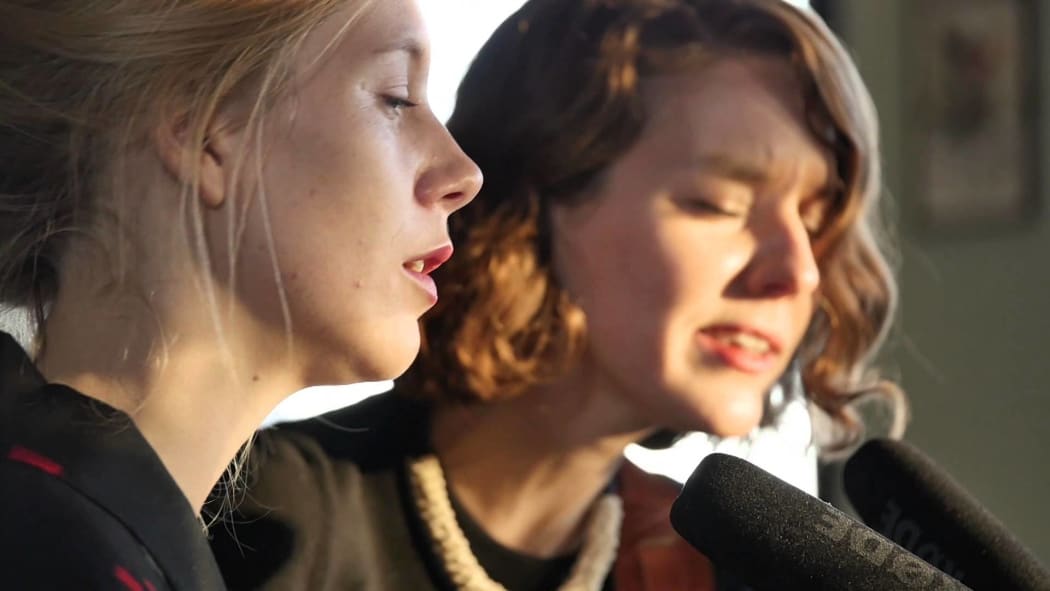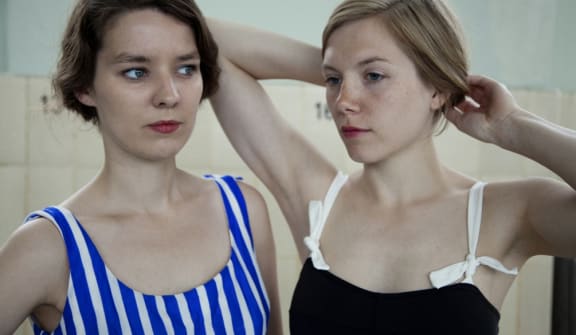Nick Bollinger talks to Scandanavian duo - and WOMAD visitors - My Bubba.

My Bubba Photo: supplied
Among the acts lined up for this year’s WOMAD is My Bubba: two Scandanavian women, My Larsdotter and Bubba Tomasdottir, hence the name. Though My pronounces her name ‘Me’, the group tends to be pronounced ‘My’ (as in the possessive case) Bubba because that’s the way it looks on paper.
Their music is quiet, centred on the voices. They weave in, out and around each other, sometimes in unison, sometimes harmony, sometimes overlapping as in a round. At other times one will take the lead, the other provide the backup.
My is Swedish; Bubba is Icelandic, so the languages and traditions they draw on are different, but as you can hear their voices and sensibilities make a natural blend. And they match their singing to handmade accompaniments; sometimes a little as some percussion, other times using a conventional guitar or a somewhat less common Norwegian harp.
Their recent album Big Bad Good was recorded in the US in 2016 and involved a bold and unusual dogma: they entered the studio without any completed material, only fragments and ideas, hoping to capture the new songs at the moment of conception. And they seem to have succeeded.

My Bubba Photo: Skaroeliena Thoansen
With their first New Zealand visit this month, I spoke on the phone to Bubba, who currently lives in Washington State.
How did you come to be singing together in the first place?
We met in Copenhagen about eight years ago. My had an apartment for rent and I was looking for a room and I answered an ad and we moved in together and when I was unpacking my boxes I heard her singing while she was doing the dishes and I asked her to come and sing on a song I was writing and she agreed even though she was lost at first because she hadn’t been singing with anyone before and wasn’t really aware of what a great singer she was. But after that day we sang almost every day together just to pass time and that’s how we enjoyed our evenings together.
Did you find you had a lot in common musically? You’re from different nationalities. Had you grown up listening to the same kind of music or did you have quite different musical backgrounds?
No we had quite different. My had been living in the US, her father was in California, so she grew up with a lot of American folk music and jazz while I grew up in Sweden and I had listened to a lot of Swedish and Scandinavian folk music so we shared our different musical backgrounds when we met. But we had a very similar taste in music and we really merged well musically.
You’ve made another record since then of Swedish folk songs. In English folk songs, a lot of which travelled to America, there’s this tradition of very dark subjects – they write about sickness and death and murder and heartbreak of various kinds. Is that the subject matter of Swedish folk songs as well?
Yeah I think there are common themes in all folk songs which is a lot about loss and a lot about loving and moving on or about the love of your love and, yes, about love. But they are dark indeed. Scandanavians seem to be very dark in their words but maybe a different kind of darkness from the English sometimes.
Was it very different recording an album in Swedish from recording Big Bad Good where you are singing in English?
Yeah it was a bit different because our musical language together has almost always been English apart from a few songs that we have sung in Icelandic so it was a first to really dive or to express ourselves in Swedish but it was also a really rewarding process and I enjoyed it very much.
How was it different? How did it feel different from singing your own songs in English?
I speak four languages fluently and when I use one language it touches deep a certain part of my personality or its more connected with things that I relate to from a certain period of time or that I relate to that country or that language, things that you can say in a certain way in one language that you can’t in another, so singing in Swedish it was just a different feeling because Swedish has associations of my time in Sweden and that culture, a little bit abstract but different from in English.
What’s the place you think of when you think of the songs on Big Bad Good. Do you think of Sweden or Scandinavia or are there other places you associate with those songs?
No I think the songs on that record are from a very internal place and not so much from a physical place as in a certain country. That record was more about the inward journey.
The most recent thing I’ve heard of yours is the single you did for Jack White’s label Third Man. It’s a great little record – both sides, really great. It’s still quiet but a much bigger sound. Was that a very different process from making the Big Bad Good album?
Yeah. We came into the studio with a different intention. We had ideas. The idea that we came into the studio with was that we wanted to make it bigger and we wanted to take advantage of working with Jack and all the musicians in the studio. We wanted to explore what that song – that we had already recorded before in a different version and in a much more sparse version – how that could grow. And collaborating with Jack and his sound was a very fun creative project.
And do you now have more of an appetite for working with other musicians and making a bigger sound?
Yeah definitely. We both wish to explore that further, to also work with the contrast and the quiet and something bigger. It’s inspiring to us right now.
My Bubba will perform at the 2018 WOMAD festival on Saturday, March 17 and Sunday, March 18.

